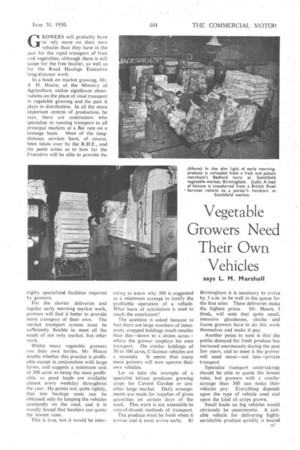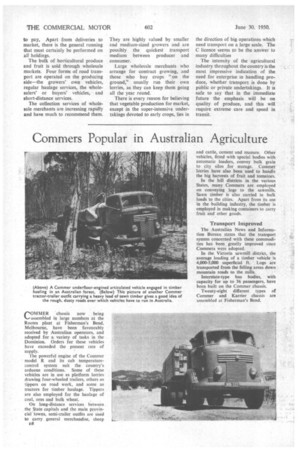Vegetable Growers Need Their Own Vehicles
Page 65

Page 66

If you've noticed an error in this article please click here to report it so we can fix it.
says L. M. Marshall GROWERS will probably have to rely more on their own vehicles than they have in the past for the rapid transport of fruit and vegetables, although there is still scope for the free haulier, as well as for the Road Haulage Executive long-distance work.
In a book on market growing, Mr. A H. Hoar; of the Ministry of Agriculture, makes significant observations on the place of road transport in vegetable growing and the part it plays in distribution. In all the more important centres of production, he says, there are contractors who specialize in running transport to all principal markets at a flat rate on a tonnage basis. Most of the longdistance services have, ofcourse, been taken over by the R.H.E., and the point arises as to how far the Executive will be able to provide the highly specialized facilities required by growers.
For the shorter deliveries and regular early morning market work, growers will find it better to provide more transport of their own. The market transport system must be sufficiently flexible to meet all the needs of not only market, but other work.
Whilst many vegetable growers run their own lorries, Mr. Hoare doubts whether this practice is profitable except in conjunction with large farms, and suggests a minimum unit of 300 acres as being the most profitable, as good loads are available almost every weekday throughout the year. He points out, quite rightly, that low haulage costs can be obtained only by keeping the vehicles constantly on the road, and it is usually found.that hauliers can quote the lowest rates.
This is true, but it would be inter
estmg to know why 300 is suggested as a minimum acreage to justify the profitable operation of a vehicle. What basis of calculation is used to reach the conclusion?
The question is asked because in fact there are large numbers of intensively cropped holdings much smaller than this—down to a dozen acres— where the grower employs his own transport, On similar holdings of 50 to 100 acres. C-licence vehicles are a necessity. It seems that many more growers will now operate their own vehicles.
Let us take the example of a specialist lettuce producer growing crops for Covent Garden or any other large market. Daily arrangements are made for supplies of given quantities on certain days of the week. This work is not amenable to rule-of-thumb methods of transport.
The produce must be fresh when it arrives and it must arrive early. At Birmingham it is necessary to arrive by 3 a.m. to be well in the queue for the first sales. These deliveries make the highest prices Mr. Hoare, I think, will note that quite small, intensive glasshouse, cloche and frame growers have to do this work themselves and make it pay.
Another point to note is that the public demand for fresh produce has Increased enormously during the past few years, and to meet it the grower will need more—not less—private transport.
Specialist transport undertakings should be able to quote the lowest rates, but growers with a smaller acreage than 300 can make their vehicles pay. Everything depends upon the type of vehicle used and upon the kind of crops grown.
Small loads on big vehicles would obviously be uneconomic. A suitable vehicle for delivering highly Perishable produce quickly is bound to pay, Apart from deliveries to market, there is the general running that must certainly be performed on all holdings.
The bulk of horticultural produce and fruit is sold through wholesale markets. Four forms of road transport are operated on the producing side—the growers' own vehicles, regular haulage services, the wholesalers' or buyers' vehicles, and short-distance services.
The collection services of wholesale merchants are increasing rapidly and have much to recommend them.
They are highly valued by smaller and medium-sized growers and are possibly the quickest transport medium between producer and consumer.
Large wholesale merchants who arrange for contract growing, and those who buy crops "on the ground," usually run their own lorries, as they can keep them going all the year round.
There is every reason for believing that vegetable production for market, except in the super-intensive undertakings devoted to early crops, lies in the direction of big operations which need transport on a large scale. The C licence seems to be the answer to many difficulties The intensity of the agricultural industry throughout the country is the most impressive indication of the need for enterprise in handling produce, whether transport is done by public or private undertakings. It is safe to say that in the immediate future the emphasis will be on quality of produce, and this will require extreme care and speed in transit.




























































































































